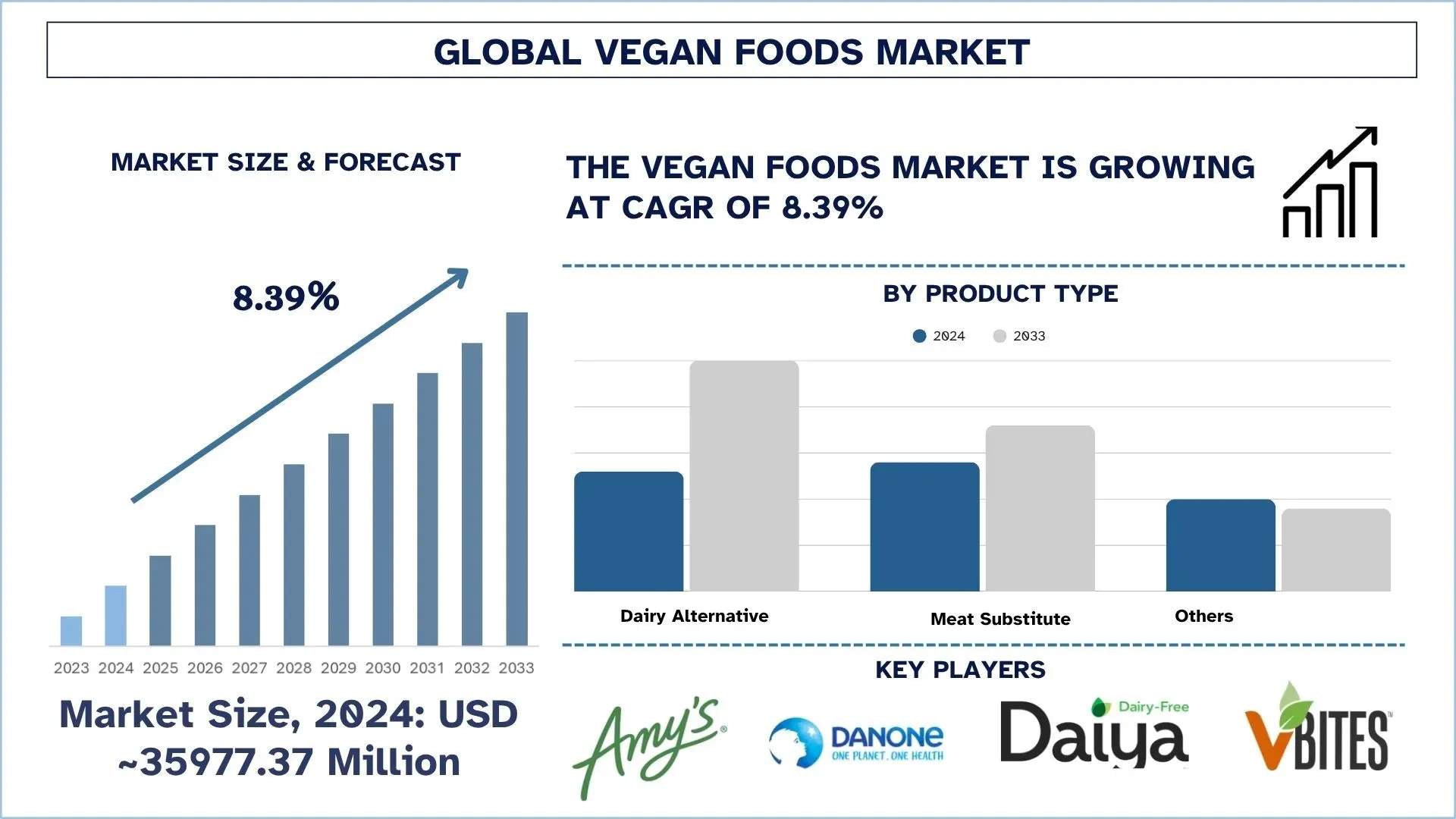According to a new report by UnivDatos, the Vegan Foods Market is expected to reach Million in 2033 by growing at a CAGR of 8.39% during the forecast period (2025- 2033F). The global vegan food market is accelerating rapidly due to the growing consciousness of consumers about the health benefits, environmental sustainability issues, and animal welfare issues associated with vegan food. In addition, there has been a notable interest in plant-based diets. The recent emphasis on clean-label products has influenced consumers in their growing interest in knowing what they are consuming. Notably, innovations in food technology, including precision fermentation and 3D printing, are enabling more plant-based foods to mimic the taste and texture of animal products. Organizations are implementing different strategies to benefit from the increasing demand for Vegan Foods. They are constantly making investments in research and development, innovations, etc.
Access sample report (including graphs, charts, and figures): https://univdatos.com/reports/vegan-foods-market?popup=report-enquiry
Key Highlights of the Report:
New techniques such as AI-formulated fats homogenization, membrane extrusion, and precision are anticipated to enhance the taste, texture, and production efficiency.
Plant-based foods are often higher in price as compared to animal-derived food products. Their manufacturing and processing further require research and development, raw materials, and a smaller scale of economies.
Several clean-label vegan products have shorter shelf lives, for example, 6 to 9 days for fresh nut milk, which creates hurdles for logistics.
Consumers are aggressively adopting vegan foods, citing health, animal welfare, and carbon footprint reduction as the major reasons.
Governments and NGOs are implementing plant-based action plans, while schools and public institutions are also adding vegan meals. These are further highlighted by the social influencers and celebrities raising awareness and normalizing vegan products.
For example, on May 6, 2024, Impossible Foods kicked off its major marketing campaign featuring a new brand rebranded to concentrate on its products and added to its line, with items like chicken tenders and hot dogs. With this strategic move, the company is trying to reach the flexitarian market (those who occasionally, or intermittently, eat meat). Further, companies are also seeing an uptick in collaborations between well-known brands and startup plant-based brands. For instance, on March 6, 2024, Oscar Mayer collaborated with The NotCo company via Kraft Heinz to create and sell plant-based hot dogs and sausages to appeal to vegan and flexitarian consumers.
Environmental rules and regulations for Vegan Foods worldwide
There are various regulations governing Vegan foods reflecting diverse priorities and stages of development.
Japan
The Japanese government has established a policy to focus on developing alternative meat-related food techniques to improve the global environment, food problems, and national health.
United States
In the United States, alternative foods have entered the major markets due to the rising animal welfare debates and positive perceptions of vegetables, depicting the higher market growth in the country.
European Union
In Europe, plant-based alternative foods, plant-based meat, cultured meat, and milk products have been listed according to the naming regulations.
India
In India, Food quality and hygiene are monitored by the Food Safety and Standards Authority of India (FSSAI), which comes under the Ministry of Health and Family Welfare. It has further listed down healthcare regulations and compliances over the years to ensure food safety in India.
According to the report, the impact of Vegan Foods has been identified to be high for the Asia-Pacific area. Some of how this impact has been felt include:
Click here to view the Report Description & TOC: https://univdatos.com/reports/vegan-foods-market
The vegan food sector in the Asia-Pacific (APAC) markets is booming because more people are becoming health-conscious. Many Asian cuisines by default are plant-based; therefore, moving to vegan diets should be easy and appealing. Moreover, plant-based products are also now available, such as plant-based dim sum and regional specialties, which meet local palates. With the rise of e-commerce platforms, many Asian countries have also benefited from an array of vegan products, helping to create a better consumer experience. Organizations in the Region are trying various approaches to advancing plant-based innovation through things such as mergers, acquisitions, partnerships, etc. In addition, ProVeg Asia-Pacific has been very supportive of plant-based innovation through initiatives such as the Food Innovation Challenge, encouraging students across 16 countries to identify sustainable, healthy vegan food solutions. For example, on February 9, 2021, the Mainland China plant-based meat brand HERO Protein, known for their chicken, beef & fish analogues, announced it had closed an USD 850K pre-seed funding round that was also being used to further the company’s continuing R&D. The Company was the first in the industry to implement high moisture extrusion technology, working with advocacy from national food industry leaders and corporates.
Contact Us:
UnivDatos
Contact Number – +1 978 733 0253
Email – contact@univdatos.com
Website – www.univdatos.com
Linkedin- https://www.linkedin.com/company/univ-datos-market-insight/mycompany/
